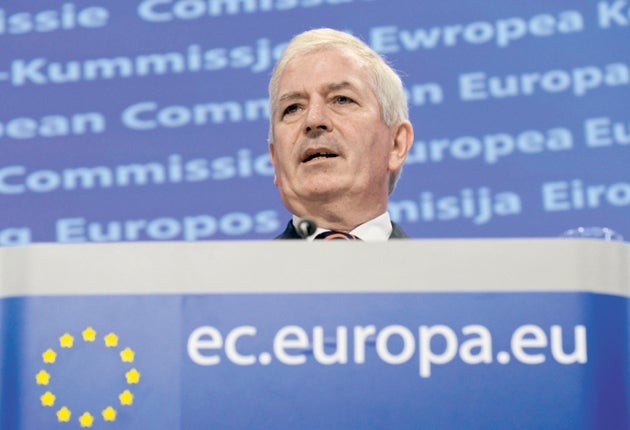Brussels pays top Eurocrats £97,000 a year – after they leave

The European Commission is having to fend off accusations of providing a gilded cage for its bureaucrats amid revelations about the extent of "golden handshakes" enjoyed by former staff. The criticism comes over claims that former commissioners are still enjoying payments of at least €97,000 [£83,000] a year even after they leave office.
At least 16 ex-commissioners are still claiming the payments, even though they have all gone on to other political or lobbying jobs since leaving the Commission last year, according to the Financial Times Deutschland.
As the most senior members of the EU's executive body, commissioners are in the top salary tier in Brussels, earning on average around €20,000 per month. Additionally, they are entitled to allowances for accommodation, travel and schooling for their children and generous pensions. When they leave, they can claim between 40 and 65 per cent of their former wage for up to three years. The practice is designed to avoid any conflict of interest which might arise if commissioners, who are in charge of EU policy making, immediately move to jobs in the private sector after leaving their posts.
According to a list obtained by the newspaper, Charlie McCreevy, the former Irish Commissioner who is now on the board of Ryanair, is among those who have not forgone the privilege. Mr McCreevy enjoys up to €47,000 a year in his new function, says the Alliance for Lobbying Transparency and Ethics Regulation. Dalia Grybauskaite, the Lithuanian President, and Franco Frattini, the Italian Foreign Minister, are also reportedly still claiming the Commission cash.
"This rule was designed to enable former Commissioners to maintain their independence and not feel they have to jump on the job market as soon as they leave," said Michael Mann, a European Commission spokesman. He added that payments cease when a Commissioner's new salary exceeds his former income and they are taxed. Although the regulation is not new and was approved by 27 member states, it is politically sensitive at a time of rising unemployment across much of Europe.
"From the PR perspective, this is definitely not helpful," said one Commission official. "There is a flurry of this every so often, when we are accused of being on a gravy train. It was the same last year with the salary rises," said the official, referring to calls to shelve a planned salary rise. The increase was unpopular with many member states but it was eventually approved after Eurocrats began industrial action.
The issue is more thorny when former commissioners such as Louis Michel and Poland's Danuta Hübner take up posts as Members of the European Parliament. Critics of the rule say they have no right to the Commission money, but both were allowed to do so.
"It would be a very nice gesture if these provisions ceased once they found a new job," says Piotr Kaczynski of the Centre for European Policy Studies, a think-tank in Brussels.
Ingeborg Graessle, a German MEP and a member of the budget committee, will seek a freeze on commissioners' pay until the regulation is changed.
Michael Mann added: "There will be an overhaul next year. We are conscious some things must be done."
Subscribe to Independent Premium to bookmark this article
Want to bookmark your favourite articles and stories to read or reference later? Start your Independent Premium subscription today.

Join our commenting forum
Join thought-provoking conversations, follow other Independent readers and see their replies